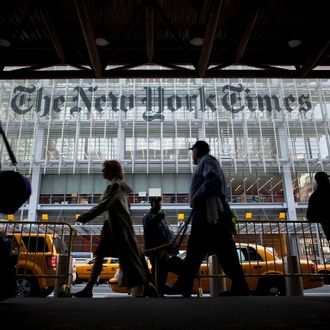
A portion of Edward Snowden’s large pile of NSA documents has been shared by the Guardian with the Times, in hopes of avoiding publication roadblocks put up by British authorities. “We are working in partnership with the NYT and others to continue reporting these stories,” the Guardian said in a statement, despite “a climate of intense pressure from the UK government.” In America, see, we have a little thing called freedom of speech.
Guardian editor Alan Rusbridger explained earlier that Britain has sought to quash its Snowden-fueled reporting on the Government Communications Headquarters, or GCHQ, its version of the NSA. “It is intended that the collaboration with the New York Times will allow the Guardian to continue exposing mass surveillance by putting the Snowden documents on GCHQ beyond government reach,” the paper explained. “Snowden is aware of the arrangement.” (The NSA leaker has previously derided the Times, and said he went to the Guardian’s Glenn Greenwald with his leaks instead, because of the paper’s past concessions to the U.S. government.)
“Once you get past the first stories by The Guardian and The [Washington] Post, no one has broken more ground than we have,” the Times’ managing editor told public editor Margaret Sullivan yesterday. Now the paper of record will have a new chance to be front and center; BuzzFeed’s Ben Smith reports that the collaborative series is “expected to be published next month,” but executive editor Jill Abramson was mum on the arrangement, stressing “my cellphone is not a secure line.”
The two newspapers worked together previously with documents obtained by WikiLeaks in 2010. “I strongly suspected that our ability to research and publish anything to do with this trove of secret material would be severely constrained in the UK,” wrote Rusbridger in a column this week. “America, for all its own problems with media laws and whistleblowers, at least has press freedom enshrined in a written constitution.” He recalled telling then-Times editor Bill Keller, “We have the thumb drive, you have the first amendment.”





























